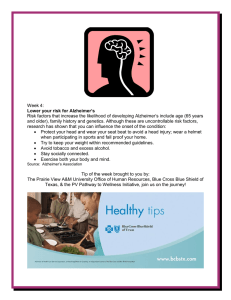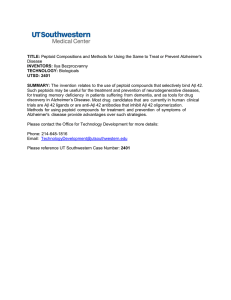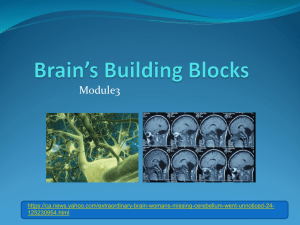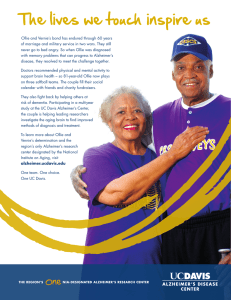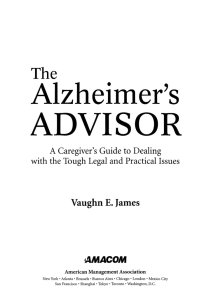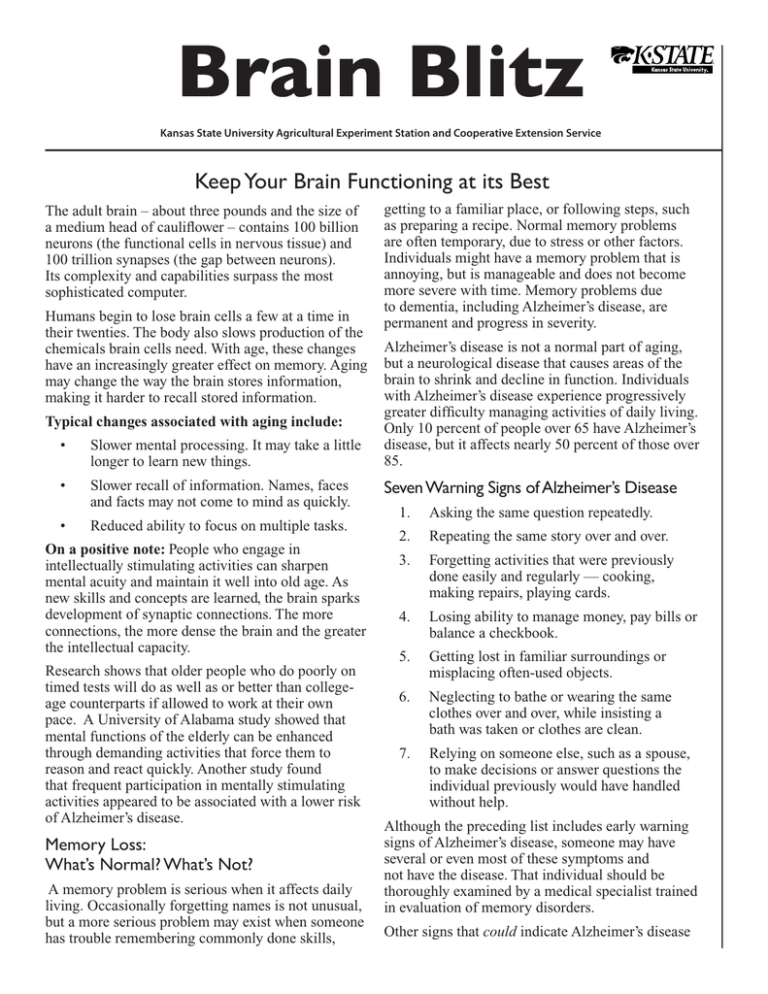
Brain Blitz
Kansas State University Agricultural Experiment Station and Cooperative Extension Service
Keep Your Brain Functioning at its Best
The adult brain – about three pounds and the size of
a medium head of cauliflower – contains 100 billion
neurons (the functional cells in nervous tissue) and
100 trillion synapses (the gap between neurons).
Its complexity and capabilities surpass the most
sophisticated computer.
Humans begin to lose brain cells a few at a time in
their twenties. The body also slows production of the
chemicals brain cells need. With age, these changes
have an increasingly greater effect on memory. Aging
may change the way the brain stores information,
making it harder to recall stored information.
Typical changes associated with aging include:
•
Slower mental processing. It may take a little
longer to learn new things.
•
Slower recall of information. Names, faces
and facts may not come to mind as quickly.
•
Reduced ability to focus on multiple tasks.
On a positive note: People who engage in
intellectually stimulating activities can sharpen
mental acuity and maintain it well into old age. As
new skills and concepts are learned, the brain sparks
development of synaptic connections. The more
connections, the more dense the brain and the greater
the intellectual capacity.
Research shows that older people who do poorly on
timed tests will do as well as or better than collegeage counterparts if allowed to work at their own
pace. A University of Alabama study showed that
mental functions of the elderly can be enhanced
through demanding activities that force them to
reason and react quickly. Another study found
that frequent participation in mentally stimulating
activities appeared to be associated with a lower risk
of Alzheimer’s disease.
Memory Loss:
What’s Normal? What’s Not?
A memory problem is serious when it affects daily
living. Occasionally forgetting names is not unusual,
but a more serious problem may exist when someone
has trouble remembering commonly done skills,
getting to a familiar place, or following steps, such
as preparing a recipe. Normal memory problems
are often temporary, due to stress or other factors.
Individuals might have a memory problem that is
annoying, but is manageable and does not become
more severe with time. Memory problems due
to dementia, including Alzheimer’s disease, are
permanent and progress in severity.
Alzheimer’s disease is not a normal part of aging,
but a neurological disease that causes areas of the
brain to shrink and decline in function. Individuals
with Alzheimer’s disease experience progressively
greater difficulty managing activities of daily living.
Only 10 percent of people over 65 have Alzheimer’s
disease, but it affects nearly 50 percent of those over
85.
Seven Warning Signs of Alzheimer’s Disease
1.
Asking the same question repeatedly.
2.
Repeating the same story over and over.
3.
Forgetting activities that were previously
done easily and regularly — cooking,
making repairs, playing cards.
4.
Losing ability to manage money, pay bills or
balance a checkbook.
5.
Getting lost in familiar surroundings or
misplacing often-used objects.
6.
Neglecting to bathe or wearing the same
clothes over and over, while insisting a
bath was taken or clothes are clean.
7.
Relying on someone else, such as a spouse,
to make decisions or answer questions the
individual previously would have handled
without help.
Although the preceding list includes early warning
signs of Alzheimer’s disease, someone may have
several or even most of these symptoms and
not have the disease. That individual should be
thoroughly examined by a medical specialist trained
in evaluation of memory disorders.
Other signs that could indicate Alzheimer’s disease
— or might be due to other causes — include:
memory loss that persistently affects work skills;
difficulty completing familiar tasks; disorientation
to time and place; poor or decreased judgment
about simple tasks, such as dressing; problems
with abstract thinking; misplacing items; extreme,
inexplicable changes in mood or behavior; changes
in personality; or loss of initiative.
Memory Loss: When to Seek Further Evaluation
Probably age-related forgetfulness ...
Talk to your doctor ...
•
When driving to an appointment, you
forget the street address, but can find the
building anyway.
•
While driving to a familiar location, you
become disoriented and have trouble
figuring out where to go.
•
You leave the faucet or stove on, but
remember just as you are on your way
out the door.
•
You leave the faucet or stove on and
leave the house – and it’s not the first
time it has happened.
•
You ask someone the same question you
asked yesterday.
•
You repeat a question several times on the
same day and don’t realize it.
•
You forget the name of someone you met
the night before, or “blank out” for a
moment on a friend’s name.
•
It sometimes takes a lot of effort to
remember the name of a close friend
or relative.
•
You complain and joke with other people
about your forgetfulness.
•
Other people express concern about your
memory lapses and suggest that you see a
doctor about it.
Source: Focus on Healthy Aging, July 2003
Avoid Memory Loss and Mental Confusion
Stay on Top of Medication Protocol
Get Regular Physical Activity
Both prescription and over-the-counter drugs
can affect memory function, as can certain drug
interactions. Classes of drugs known to affect
memory and brain function include sleeping
pills, anti-anxiety medications, painkillers,
antihistamines (allergy medications) and
antidepressants.
Regular exercise increases the flow of blood
to the brain and contributes to other changes
relating to alertness. Experts recommend a
minimum of 30 minutes of moderate intensity
physical activity on most days to supply the brain
and body with oxygen. For greater health benefits
and to help prevent weight gain, increase the
intensity or amount of time to 60 minutes a day.
A weight gain or loss of 10 or more pounds
can affect the body’s reaction to the usual dose
of medicine.
Consuming too much alcohol – or drinking any
alcohol at all while taking certain medications
– may result in symptoms of memory loss.
Be sure your doctor knows of other prescribed and
over-the-counter medications being used, including
herbal products, topical items such as arthritis
ointments, dietary supplements, and weight loss or
smoking cessation products.
Know what is normal for you so you can recognize
any physical or mental changes that appear when
beginning new medications.
2
Physical activities should include: cardiovascular
conditioning such as walking, swimming, water
aerobics; resistance exercises or calisthenics such
as gardening, carrying groceries, or using weights
for muscle strength and endurance; and stretching
exercises for flexibility.
Practice Good Nutrition
Follow the Dietary Guidelines for Americans.
Let the Food Guidance System, My Pyramid, help
you make healthy food choices. Choose the most
nutritionally rich food you can from each food
group each day. Balance calorie intake with your
expenditure of energy.
Fruits, vegetables and whole grains are especially
important. For a 2,000-calorie/day intake, eat 2 cups
of fruit a day and 2 1/2 cups of vegetables. Consume
at least 3 ounces equivalent of whole-grain cereals,
breads, crackers, rice or pasta every day. One ounce
equivalent is 1 slice of bread, 1 cup breakfast cereal
or 1/2 cup cooked rice or pasta.
Fruits, vegetables and whole grains are good
sources of brain-boosting vitamins and antioxidants.
Of special importance are foods rich in vitamin C;
vitamin E; beta-carotene; and the B vitamins folate,
thiamin and B6.
Choose foods low in saturated fat, cholesterol and
trans-fats. (Trans-fats are partially hydrogenated
fats found in hard margarine, baked goods and other
kinds of processed foods.)
Choose foods low in added sugars and sodium (salt).
If you drink alcohol, do so in moderation.
Use food safety practices that reduce the possibility
of food-borne illness.
Include a Rich Supply of Omega-3 Fatty Acids
in the Diet
Omega-3 fats help improve mood, prevent and
relieve depression, prevent and treat heart disease
and certain cancers, and relieve symptoms of
inflammatory conditions such as arthritis. Foods rich
in omega-3s are cold-water fish (salmon, tuna, lake
trout and mackerel), walnuts, canola oil, flax and
green leafy vegetables.
Supplement with Vitamin B12
Absorption of vitamin B12 decreases with age. People
who cannot absorb B12 from food can absorb it from
supplements, which should have 2.4 micrograms of
the nutrient. Vitamin B12 helps control homocysteine
levels and may help prevent Alzheimer’s disease.
(Homocysteine is an amino acid associated with
Alzheimer’s disease and heart disease.) Foods rich in
B12 are meat, eggs and dairy products.
Drink Plenty of Fluids
Twenty-five percent of water consumed goes to
help the brain function. Too little water can cause
anxiety and irritability. Stress can cause the brain to
dehydrate slightly, so extra fluids are needed when
tired, worried or under pressure. Drink water, 100
percent fruit or vegetable juices and eat high-water
solid foods. Report bouts of diarrhea, vomiting or
heat exhaustion to your physician. Dehydration can
cause medications to be more concentrated, altering
the way the body metabolizes them.
Go Easy on Alcohol
Risk of brain damage increases with the amount of
alcohol consumed and duration of consumption.
Some studies have shown protection against
stroke with low or moderate alcohol use, but
individuals who do not drink should not start for
“health” purposes. Limit alcohol to one drink a
day for women, two drinks for men.
Practice Good Health Habits
Identify and Treat Depression
Depression can appear to be a cognitive deficit
when sad feelings crowd out recall ability,
judgment and focus. Often when depression
is treated, memory improves. New treatments,
including use of SAMe (S-adenosylmethionine),
have shown promise when other treatments were
not helpful or tolerated well. Professional help is
indicated for the following: feeling sad, helpless
or tired all of the time; eating and sleeping
habits change; showing little interest in once
enjoyable activities; or being unusually confused
or too easily distracted.
Manage Diabetes and Thyroid Conditions
People with diabetes should monitor blood
sugars, exercise faithfully and eat foods on the
schedule and in the quantity needed to keep
blood sugar levels stable. Diabetes can hinder
oxygen-rich blood from reaching brain cells
in adequate amounts. The thyroid produces
hormones important to mental functioning,
including memory. Take prescribed medications.
Control High Cholesterol
and High Blood Pressure
Work with medical professionals to monitor
and control cholesterol and blood pressure.
To maintain control: Lose excess weight;
engage in regular physical activity; reduce
sodium consumption; eat more fresh and fewer
packaged and prepared foods; have two or three
daily servings of low or nonfat dairy foods;
and eat potassium-rich foods such as fruits and
vegetables. In general, anything that is good for
your heart is good for your head.
Don’t Smoke
Smoking harms blood vessels, the heart, lungs
and other organs as well as the brain.
Don’t Use Mind-Damaging Substances
The illegal drug “ecstasy” has been shown to
cause long-term memory loss. Ecstasy use
combined with cannabis (marijuana) impairs
both long-term and short-term memory. Users
of both substances might expect memory
afflictions in later life.
3
Limit Exposure to Lead
Lead is a known neurotoxin. Exposure results in
cognitive decline.
Use Hearing Aids or Glasses if Needed
It is hard to stay intellectually engaged if you can’t
hear or see the world.
Light Up Your Life
Natural or full-spectrum light helps the brain
function at its best, combats fatigue and — for
many people — eases depression.
Exercise the Brain
Get Plenty of Sleep
Regular loss of an hour or two of needed sleep
can impair brain function. Factors that can prevent
good sleep include medicines, pain, inactivity,
eating too much, certain foods, caffeine or alcohol.
Get some aerobic and other physical activity every
day. Avoid snacking after dinner and go to bed at a
regular time.
Relieve Stress
Chronic stress has a direct effect on the brain.
Elevations in cortisol — a “fight or flight”
hormone — during stressful periods can damage
cells in one of the brain’s memory centers, the
hippocampus. Elevated cortisol can also halt
production of new hippocampal neurons that help
commit facts to memory. Understand what causes
stress and eliminate or modify stressful situations.
Try to control reactions to stress, and do things
that promote inner peace.
Talk out feelings with a trusted friend. Engage in a
stimulating hobby. Other helps: prayer or spiritual
activities, deep breathing, exercise, yoga, pets, a
serene environment, music, laughter.
Respond to Stroke as an Emergency
A stroke is a “brain attack” and should be treated
with the same urgency as a heart attack. Quick
diagnosis and treatment could prevent permanent
brain damage.
Control Pain and Infections
Pain is the “fifth vital sign” behind heart rate,
blood pressure, temperature and respiration.
Besides medication, help for pain can include
exercise, weight loss if overweight, stretching,
relaxation and meditation. Distractions can help
take the mental focus off physical pain.
Full-blown infections, as well as infections that
slightly elevate body temperature, can cause
mental confusion. Seek medical attention to
identify the cause and begin appropriate treatment.
Tell the Doctor About Falls or Head Injuries
A fall or serious bump on the head may be the
cause of memory problems or dizziness. The
doctor will need to rule out a concussion or other
potential problems that arise from such events.
4
Remain or Become Socially Active
Staying socially active lowers the risk of
developing Alzheimer’s disease. Socializing is
one of the best mental workouts. Sharing with
others always comes with the potential of mental
stimulation that lights pathways between neurons.
For example, read to a child, talk on the phone,
visit with family or do volunteer work.
Limit Time Spent Watching Television
If a person only watches television and almost
never talks, nerve connections in the part of the
brain responsible for speech will shrink. Brain
waves of someone watching TV are similar to those
of someone who is asleep. Choose programs that
promote laughter and elevate feelings of well being
or those that test problem-solving abilities — such
as game shows. Watch the news, then try to recall
the topics that were covered.
Use Humor
Laughter bonds people together and relieves
tension. Deep, hearty laughter boosts the immune
system and produces endorphins, which are natural
painkillers. A good laugh helps oxygen get to the
brain.
Maintain a Positive Attitude
Happiness enhances alertness and the ability to
receive new information. Optimists tend to live
longer and have a lower risk of premature death
than those who are more pessimistic.
Cultivate an “attitude of gratitude.”
Those who appreciate the good things in the
world around them have less disease and less
pain. A thankful attitude encourages physical,
mental and spiritual well being. It promotes
balanced optimism, openness to opportunities,
and enhancement of general well being and
effectiveness.
Expect Your Memory to Stay Sharp
There is a strong link between culture and memory.
Some cultures have the belief that aging causes
an inevitable decline in memory skills. In cultures
where that preconception does not exist, older
people perform as well as young subjects in
memory tests. If people expect their memories to
get worse with age, they may stop trying so hard to
remember.
Keep Your Perspective
Normal aging changes the brain, which makes
your mind slightly less efficient in processing new
information. But Dr. Paul Takahashi, specialist in
geriatrics and expert on cognitive decline at Mayo
Clinic, Rochester, Minn., emphasizes that wisdom
can compensate for physical changes.
“It’s true that we lose some capacity for new
memory. However, experience compensates for this
loss. Older adults can still operate at an extremely
high functional level despite physiologic changes.
Everyone has difficulty remembering things at
times. So don’t lose sight of how much you do
remember. Wisdom is built from a lifetime of
memories.”
Exercise the Mind
Mental activity keeps the mind sharp and agile.
It is important to experience new frontiers.
Continuing to learn and challenging the brain
causes it to grow, literally. Regardless of age,
an active brain produces new dendrites –
connections between nerve cells that allow them
to communicate with one another. This helps the
brain store and retrieve information more easily,
no matter what your age.
Mind-Stimulating Exercises
• Learn to play a musical instrument.
• Make up your own list of proverbs.
• Play Scrabble or other board games. Play cards.
• Plan a surprise for someone.
• Work crossword puzzles, word searches or
other brain-teasers.
• Do math problems in your head or on
paper before using a calculator.
• Interact with people. Volunteer. Join an
organization.
• Memorize poems, verses, jokes or songs.
• Switch careers or start a new one.
• Start a new hobby or revisit an old one, such
as painting, biking, bird-watching, bowling or
quilting.
• Learn a foreign language.
• Stay informed about local, state, national and
world events.
• Try to do something new and different
every day.
• Garden: Grow a new flower or vegetable.
• Play jacks, pick-up sticks or carefully cut
out pictures from old magazines. (Eyehand coordination activities stimulate
parts of the brain that may not have been
challenged lately.)
• Read, both silently and aloud (it works different
parts of the brain).
• Breathe deeply; use total lung capacity.
• Join a book discussion group. Be in a play.
• Read a newspaper story upside down.
• Spend time with family and friends.
• Go to athletic events and cheer for your
team with enthusiasm.
• Spend time with children. Read aloud.
• Learn to use a computer. Explore the Internet.
• Take a class. Get involved in Elderhostel
events. Go to movies, lectures, museums or a
new restaurant.
• Go dancing. Join an exercise group. Swim.
• Write your life story, or write someone else’s
story.
• Take different routes when you travel.
• Write, draw, brush your teeth or do other
tasks with your less-dominant hand. Write
with both hands at the same time.
• Do something familiar in a different way
than usual.
• Spell words backwards.
5
Ideas to Help Memory
Information is stored in different parts of your memory. Short-term memory may include the name
of a person you just met. Recent memory may include what you ate for breakfast. Remote memory
includes things that you stored in your memory years ago, such as memories from childhood.
The goal is to keep all three types of memory as sharp as possible. To put information into memory
so you can recall it later requires getting the information to the brain, storing it and being able to
recall it later. The following ideas may help:
• Keep lists. Put lists in the same place(s) so
you can add to them and remember to take
them with you.
• Practice repetition. Repeat names when you
meet new people.
• Designate specific locations for frequently
used items, such as keys, purse, phone
numbers and addresses.
• Run through the ABC’s in your head to help
you think of words you are having trouble
remembering. Hearing the first letter of a
word may jog your memory.
• Follow a routine, especially for important
items such as taking medication or where
you put your glasses.
• Take time to remember. Give full
attention to the task at hand. To learn new
information, repeat or write it.
• Have a designated spot for “take-with-you”
items (or send-home-with-the-children
items).
• Don’t talk or read with a lot of background
distractions, such as a loud TV or radio.
• Say aloud what it is you need to remember.
• Set up cues. Put your car keys next to
something you need to remember to turn off,
such as the iron on the ironing board.
• Visualize. Picture yourself doing the task
that you need to remember to do.
• Chunk the information, such as license plate
or phone numbers: a 10-digit number, such
as a phone number, 3013661755 becomes
301-366-1755. Social security numbers
are three numbers, two numbers, then four
numbers: 123-12-1234
• Make associations (connect things in your
mind), such as using landmarks to help you
find places.
• Use rhymes or word associations. For
example, “Thirty days hath September . . .” or
“Spring Forward, Fall Back.”
• Don’t take on too many mental tasks all at
once. Pace yourself.
• Keep a detailed calendar. Check it daily.
• Write it down. Keep a diary.
6
• Keep a small notepad with you, and use it
to jot down the names of new acquaintances
and other things you don’t want to forget.
• Put sticky notes on the telephone to remind
you of calls to make or put a note on your
steering wheel to remind you of errands that
might be different than your usual routine
such as “mail a letter” or “stop by the bank.”
A note on the bathroom mirror could remind
you of such tasks as “put clothes in the
dryer” or “turn off lawn sprinkler.”
• Practice relaxation techniques. Breathe
slowly and deeply at a regular pace.
• Follow advice for good health: Exercise.
Stretch. Bend. Build and maintain strength.
Raise your heart rate. Eat right. Drink lots of
water. Don’t smoke.
• Leave yourself “don’t forget” messages or
“be-sure-to-remember” messages on your
answering machine.
• To retrieve information from remote
memory, try focusing on the sounds, smells
and sights of the time period you are trying
to recall.
What Hasn’t Been Proven to Improve
Memory, but Is Promoted Anyway
Memory-enhancing supplements
A number of herbal and other supplements are
advertised to help improve mental clarity. Few of
the claims are backed by science-based research.
Conclusions of well-done studies are often
contradictory.
Be wary of testimonial claims. Seek information
from respected sources such as:
National Institutes of Health, Office of Dietary
Supplements — http://ods.od.nih.gov
Medical Library Association — http://mlanet.org
Tufts University Nutrition Navigator —
http://navigator.tufts.edu
National Library of Medicine —
http://medlineplus.gov
U.S. Department of Health and Human Services —
http://healthfinder.gov
The IFIC Founcation (an educational foundation) —
http://ific.org
Mayo Clinic — http://www.mayo.com
Use Caution
The safety of supplements is not guaranteed. In
1994, Congress passed the Dietary Supplement
Health and Education Act, which removed
them from the premarket safety evaluations
required of foods and drugs. These products
can be withdrawn after a problem is found. In
addition, there is no standard of product purity
or the amount of active ingredient in any given
supplement – even from one package to the next.
The UC Berkeley Wellness Letter says, “Until
further research is done on ways to correct
memory lapses, we advise you to forget one
thing – the claims of supplement makers. So far,
there’s no brain supplement that will help you
recall a name or find your keys.”
Some Final Thoughts
Many factors can affect memory and mental
functioning. Tests by a qualified medical
professional can determine if Alzheimer’s
disease or other condition is present.
Lifestyle and attitude play major roles in
maximizing optimal mental functioning.
People who engage in intellectually stimulating
activities can sharpen their mental acuity and
maintain it well into old age.
Things to do to lift your heart and spirit
Smile more!
Listen more intently
Watch a child discover something new.
Make room for new friends.
Be free with compliments.
Do something totally silly once in a while!
Tell the people you love that you love them.
Call old friends and catch up on their lives.
Pray more and worry less!
Be quick to forgive others and learn to forgive yourself.
Whatever you do, give it your best shot!
Accept help when it’s offered.
Challenge your body and your brain.
Accept yourself for who you are.
Look at the big picture and don’t sweat the small stuff!
Watch the sunset and realize that just as no two sunsets
are alike,
So you are a unique and beautiful creation.
(from The Comfort of Home, Caregiver Assistance News,
North Central-Flint Hills Area Agency on Aging, Inc.,
February 2004)
7
Brain Blitz References
Aerobics of the Mind Mental Fitness: 100 Exercises For A Healthy Brain, Marge Engelman, $18.95, ISBN 1-57861-123-7
Alzheimer’s Association, www.alz.org, 1-800-272-3900
Alzheimer’s Disease Education and Referral Center, www.alzheimers.org, 1-800-438-4380
Caregiver Assistance News, North Central-Flint Hills Area Agency on Aging, Inc., February 2004
College of Family and Consumer Sciences, University of Georgia, www.fcs.uga.edu
Consumer Reports on Health, August 2003
FDA Consumer, July-August 2003
http://familydoctor.org
http://healthinfo.health-first.org
http://ific.org/foodinsight (Sept./Oct. 2003)
http://www.intelihealth.com (Medical content reviewed by the faculty of the Harvard Medical School)
http://www.medlineplus.gov
http://mentalhelp.net
Live Smart! Be Smart! How a Healthy Lifestyle Promotes Mental and Emotional Vitality; Eat Smart! Be Smart! A ‘Recipe’ for Keeping Your
Brain in Shape; and Medicine and Herbal Safety: Easing Your Mind; by Jodi Stotts, MS; Mary Meck Higgins, PhD, RD, LD,
CDE; and Valentina Remig, PhD, RS, FADA. Herbal Safety reviewed by Ronald G. Riley, R.Ph.
Mayo Clinic, www.mayoclinic.com
Memory - The John Hopkins White Papers 2005, John Hopkins Medicine, Baltimore, Maryland
Mount Sinai School of Medicine, Focus on Healthy Aging, July 2003
National Institute on Aging, www.niapublications.org
National Institutes of Health, www.nih.gov
Platt, Cyndy. “Hospital Report,” Junction City Daily Union, Feb. 18, 2004, “Sometimes Laughter is the Best Medicine.”
Tufts University Health and Nutrition Letter, “Keeping Your Mind Strong As You Age,” February 2003
UC Berkeley Wellness Letter, October 2000
U.S. Department of Health and Human Services and U.S. Department of Agriculture, 2005 Dietary Guidelines,
www.healthierus.gov/dietaryguidelines
Where did I put . . .? Donna R. Martinson, K-State Research and Extension, Geary County Agent, Spring 2003; Wilda Easterday, K-State
Research and Extension, Meade County, 2001.
Donna R. Martinson
Family and Consumer Sciences Agent
K-State Research and Extension – Geary County
119 E 9th Street
Junction City, KS 66441
Phone: 785-238-4161
Brand names appearing in this publication are for product identification purposes only. No endorsement is intended,
nor is criticism implied of similar products not mentioned.
Publications from Kansas State University are available on the World Wide Web at: www.oznet.ksu.edu
Contents of this publication may be freely reproduced for educational purposes. All other rights reserved.
In each case, credit Donna Martinson, Brain Blitz, Kansas State University, November 2005.
Kansas State University Agricultural Experiment Station and Cooperative Extension Service
MF 2693
November 2005
K-State Research and Extension is an equal opportunity provider and employer. Issued in furtherance of Cooperative Extension Work, Acts of May 8 and June
30, 1914, as amended. Kansas State University, County Extension Councils, Extension Districts, and United States Department of Agriculture Cooperating,
Fred A. Cholick, Director.

